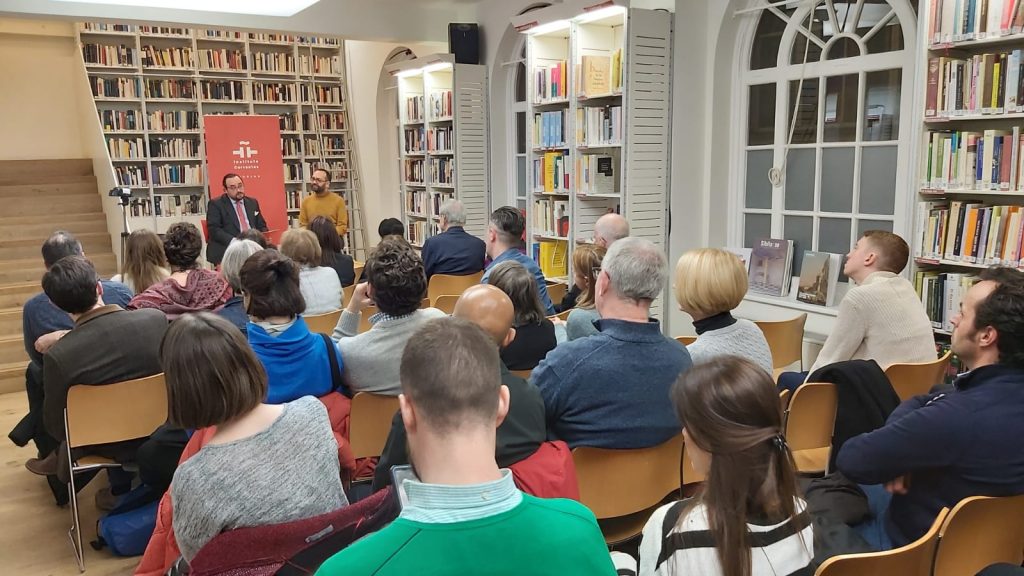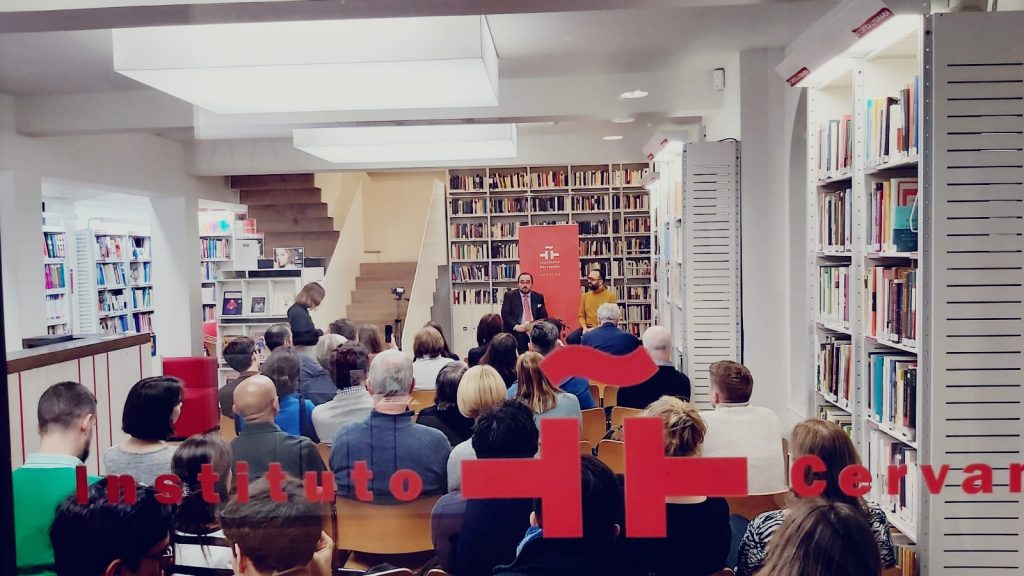Jose Pizarro: «It is an illusion that people already understand our product»

«All the great Spanish chefs are coming to this country and it is an illusion that people already understand our product, that they understand what is ham, Pimentón, our oils, our vinegars and all the variety of our gastronomic culture,» explained Spanish chef José Pizarro during his participation in a series of talks called the Blanco- White Dialogues, in a conversation with the director of the Cervantes Institute in London, Ignacio Peyró.
Director of Instituto Cervantes in London highlighted how “gastronomy is one of the best tools of cultural diplomacy and that we must support the talent of our creators and entrepreneurs of the great larder that is Spain.»

A very nice and very hard journey
The chef from Extremadura considers himself a very positive person and believes that, in the UK, he is in «a country of diversity and made by us foreigners, although I do not consider myself that way. I consider myself a part of this culture.»
The chef said that what he enjoys the most about London is its «diversity». He remembers falling in love with the British Capital city on his first landing at Gatwick Airport. «It has been a very nice period of my life since I came here; this country from the beginning, it has agreed very well with me, it has given me many opportunities, it has received me very well and opened all the doors.»
Pizarro arrived with only a little English and did not know what he was going to find. Little by little, «fighting, working and enjoying, and with the 100% Iberian ham as a flag,» he made his own space. He defined it as «a very nice and very hard journey too» – full of enjoyment and completely without regret.

Over his last 20 years in the British capital, Pizarro has tried to rectify the lack of knowledge the UK has about Spanish gastronomic culture. He discovered it was never in the press, and it was not known or talked much about. Many locals confused Spanish products with other countries, for example: Iberian ham was thought to be Italian prosciutto. Pizarro now happily acknowledges that things have «changed a lot», and quoted that now you can find Pimentón de la Vera in any corner of the city.
In the same way, he said that the interest in the Spanish language has risen greatly and the importance of chefs like Arzak and Adriá who both have an impressive projection and creativity.

On his Invitation to the Blanco-White Dialogues
«It is an honor. It is very emotional here, and it’s wonderful for me to be here today at Instituto Cervantes London and to be able to share a little of my life and my journey in my language,» said Pizarro. The Blanco-White Dialogues bring great guests related to Spanish culture and relations between Britain and Spain to the British public.
The next one will be the Spanish journalist and writer Juan Luis Cebrián, in a talk that will take place on Monday, February 3 at 7:00 p.m. Previously, the dancer and director of the English National Ballet, Tamara Rojo, and the writer and Cervantes Prize in 2017 Eduardo Mendoza participated.
José Pizarro: «Es una ilusión que la gente ya entienda nuestro producto»

“Todos los grandes chefs españoles están viniendo a este país y es una ilusión que la gente ya entienda nuestro producto, que entienda lo que es el jamón, el pimentón, nuestros aceites, nuestros vinagres y toda la variedad de nuestra cultura gastronómica”, explicó hoy el chef español José Pizarro durante su participación en un encuentro de la nueva serie de Diálogos Blanco-White, en una conversación con el director del Instituto Cervantes de Londres, Ignacio Peyró.
El director del Instituto Cervantes de Londres destacó como “la cocina es una de las mejores herramientas de la diplomacia cultural y estamos muy contentos de apoyar el talento de nuestros creadores y emprendedores de esa gran dispensa que es España.

Un recorrido muy bonito y muy duro
El chef extremeño se considera una persona muy positiva y cree que está en “un país de diversidad y hecho por nosotros, que somos los extranjeros, aunque yo no me considero así, me considero una parte de esta cultura”.
El extremeño recalcó que lo que más me disfruta de Londres es “la diversidad” y se acuerda de su primer aterrizaje en el aeropuerto de Gatwick, un primer momento desde el que le gustó la capital británica. “Ha sido un recorrido muy bonito desde que llegué a aquí, este país desde el principio, se ha portado muy bien conmigo, me ha dado muchas oportunidades, me ha recibido muy bien y me abierto todas las puertas”.
Pizarro llegó prácticamente sin hablar nada de inglés y no sabía lo que se iba a encontrar, pero poco a poco, “luchando, trabajando y disfrutando, y con el jamón ibérico 100% como bandera”, se ha hecho un hueco. Lo definió como “un recorrido muy bonito y muy duro también”, en el que ha disfrutado mucho y en el que no se arrepiente de nada de lo que ha hecho.

Tras pasar estos últimos 20 años en la capital británica, Pizarro apuntó a como antes no había mucho en prensa sobre la cultura gastronómica española y no se conocía ni se hablaba mucho de ella. Muchos locales confundían el producto español con el de otros países, por ejemplo el jamón ibérico, que se pensaban que era prosciutto italiano, pero el chef reconoce que las cosas “han cambiado mucho”, y sin ir más lejos, citó como ahora se puede encontrar el Pimentón de la Vera en cualquier rincón de la ciudad.
En esa línea, precisó que el interés por el idioma español ha subido muchísimo y la importancia de chefs como Arzak y Adriá, con una proyección y una creatividad impresionantes.

Invitado a los Diálogos Blanco-White
“Es un honor, es muy emotivo y muy bonito para mí estar hoy en el Instituto Cervantes de Londres y poder compartir un poco de mi vida y mi recorrido en mi lengua”, destacó Pizarro. Los Diálogos Blanco-White acercan al público británico a grandes personajes relacionados con la cultura española y las relaciones entre Gran Bretaña y España.
El próximo invitado de los Diálogos Blanco-White será el periodista y escritor español Juan Luis Cebrián, en un encuentro que tendrá lugar el lunes 3 de febrero a las 19:00 horas. Previamente participaron la bailarina y directora del English National Ballet, Tamara Rojo, y el escritor y Premio Cervantes en 2017 Eduardo Mendoza.


